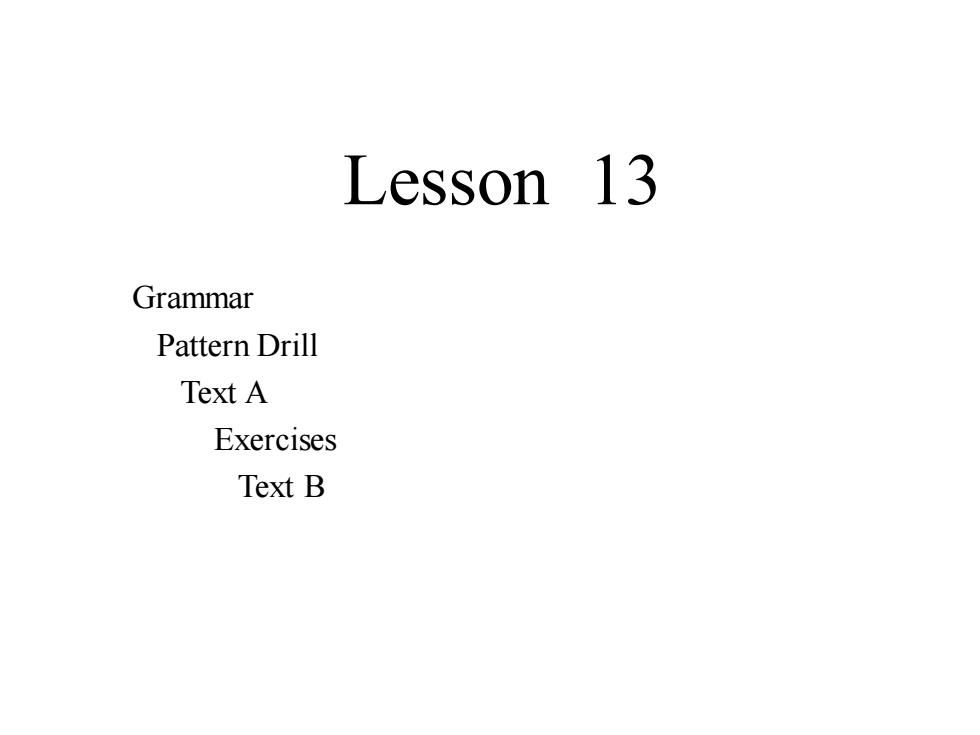
Lesson 13 Grammar Pattern Drill Text A Exercises Text B
Lesson 13 Grammar Pattern Drill Text A Exercises Text B
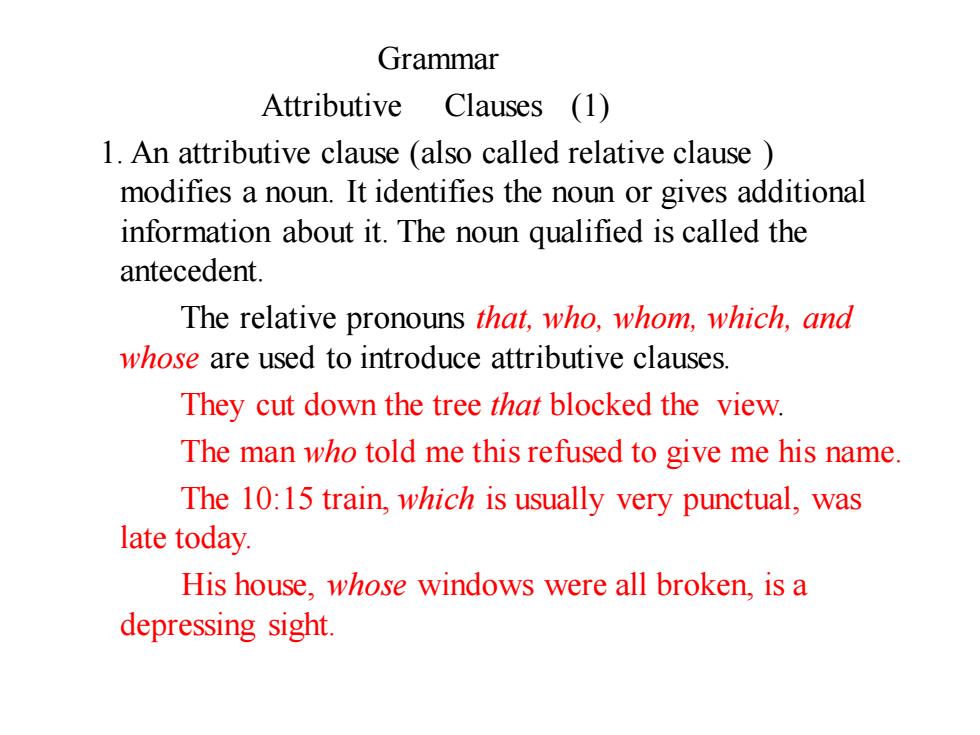
Grammar Attributive Clauses (1) 1.An attributive clause (also called relative clause modifies a noun.It identifies the noun or gives additional information about it.The noun qualified is called the antecedent. The relative pronouns that,who,whom,which,and whose are used to introduce attributive clauses. They cut down the tree that blocked the view. The man who told me this refused to give me his name. The 10:15 train,which is usually very punctual,was late today. His house,whose windows were all broken,is a depressing sight
Grammar Attributive Clauses (1) 1. An attributive clause (also called relative clause ) modifies a noun. It identifies the noun or gives additional information about it. The noun qualified is called the antecedent. The relative pronouns that, who, whom, which, and whose are used to introduce attributive clauses. They cut down the tree that blocked the view. The man who told me this refused to give me his name. The 10:15 train, which is usually very punctual, was late today. His house, whose windows were all broken, is a depressing sight
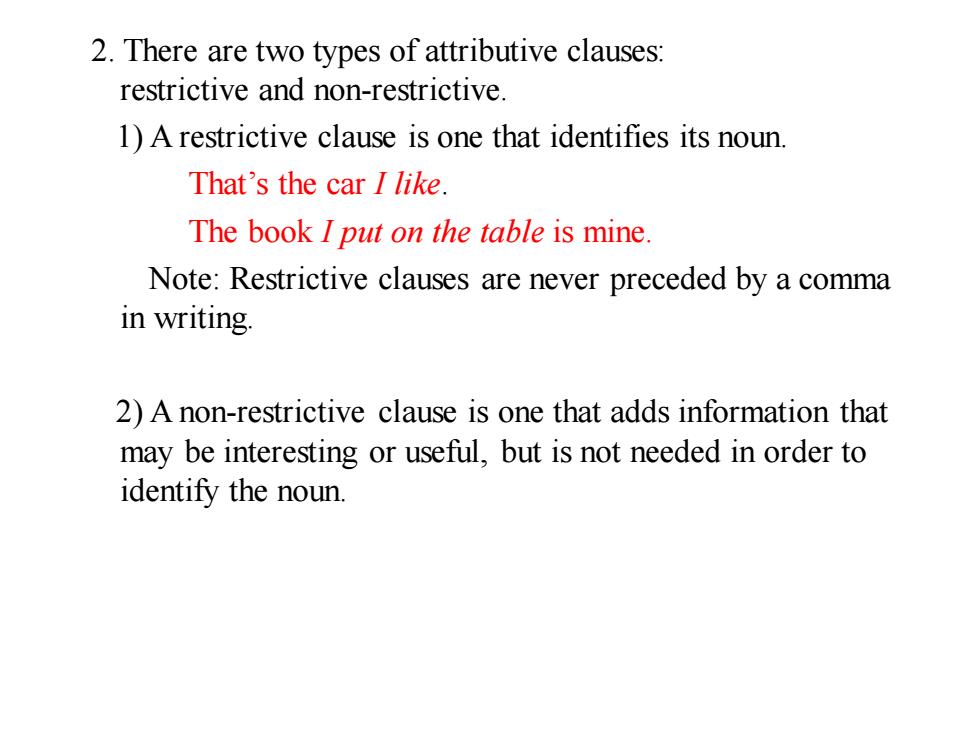
2.There are two types of attributive clauses: restrictive and non-restrictive. 1)A restrictive clause is one that identifies its noun. That's the car I like. The book I put on the table is mine. Note:Restrictive clauses are never preceded by a comma in writing. 2)A non-restrictive clause is one that adds information that may be interesting or useful,but is not needed in order to identify the noun
2. There are two types of attributive clauses: restrictive and non-restrictive. 1) A restrictive clause is one that identifies its noun. That’s the car I like. The book I put on the table is mine. Note: Restrictive clauses are never preceded by a comma in writing. 2) A non-restrictive clause is one that adds information that may be interesting or useful, but is not needed in order to identify the noun

Mr.Jones,for whom John was working, was very generous about overtime payments. Radium,which is a rare element,is used in medicine. Note:A non-restrictive clause is often written with commas before and after,and is spoken with small pauses. 3.Relative pronouns are words,which join the attributive clauses to the main clauses.At the same time,they do the work of ordinary pronouns. 1)Use of relative pronouns,except that
Mr. Jones, for whom John was working, was very generous about overtime payments. Radium, which is a rare element, is used in medicine. Note: A non-restrictive clause is often written with commas before and after, and is spoken with small pauses. 3. Relative pronouns are words, which join the attributive clauses to the main clauses. At the same time, they do the work of ordinary pronouns. 1) Use of relative pronouns, except that
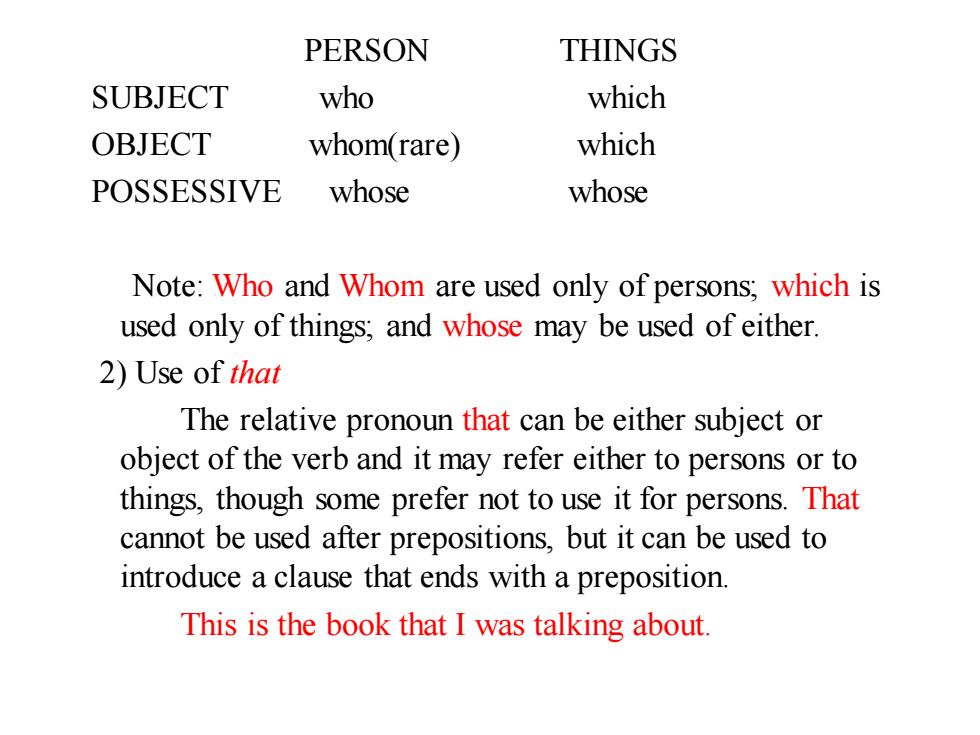
PERSON THINGS SUBJECT who which OBJECT whom(rare) which POSSESSIVE whose whose Note:Who and Whom are used only of persons;which is used only of things;and whose may be used of either. 2)Use of that The relative pronoun that can be either subject or object of the verb and it may refer either to persons or to things,though some prefer not to use it for persons.That cannot be used after prepositions,but it can be used to introduce a clause that ends with a preposition. This is the book that I was talking about
PERSON THINGS SUBJECT who which OBJECT whom(rare) which POSSESSIVE whose whose Note: Who and Whom are used only of persons; which is used only of things; and whose may be used of either. 2) Use of that The relative pronoun that can be either subject or object of the verb and it may refer either to persons or to things, though some prefer not to use it for persons. That cannot be used after prepositions, but it can be used to introduce a clause that ends with a preposition. This is the book that I was talking about
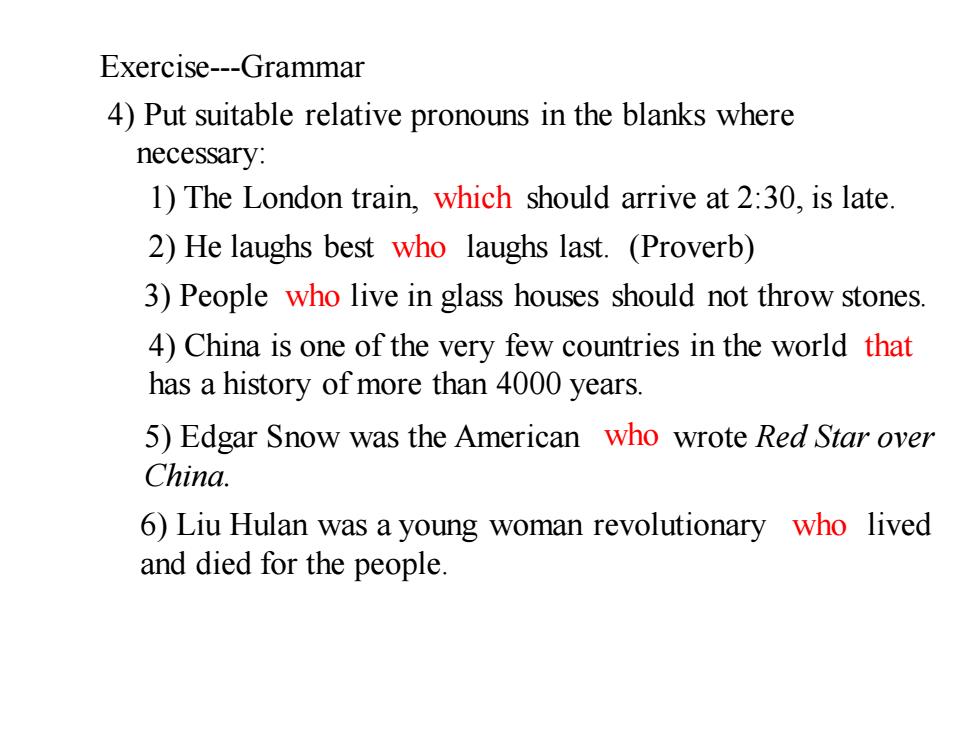
Exercise---Grammar 4)Put suitable relative pronouns in the blanks where necessary: 1)The London train,which should arrive at 2:30,is late. 2)He laughs best who laughs last.(Proverb) 3)People who live in glass houses should not throw stones. 4)China is one of the very few countries in the world that has a history of more than 4000 years. 5)Edgar Snow was the American who wrote Red Star over China. 6)Liu Hulan was a young woman revolutionary who lived and died for the people
Exercise---Grammar 4) Put suitable relative pronouns in the blanks where necessary: 1) The London train, should arrive at 2:30, is late. which 2) He laughs best laughs last. (Proverb) who 3) People live in glass houses should not throw stones. who 4) China is one of the very few countries in the world has a history of more than 4000 years. that 5) Edgar Snow was the American wrote Red Star over China. who 6) Liu Hulan was a young woman revolutionary lived and died for the people. who
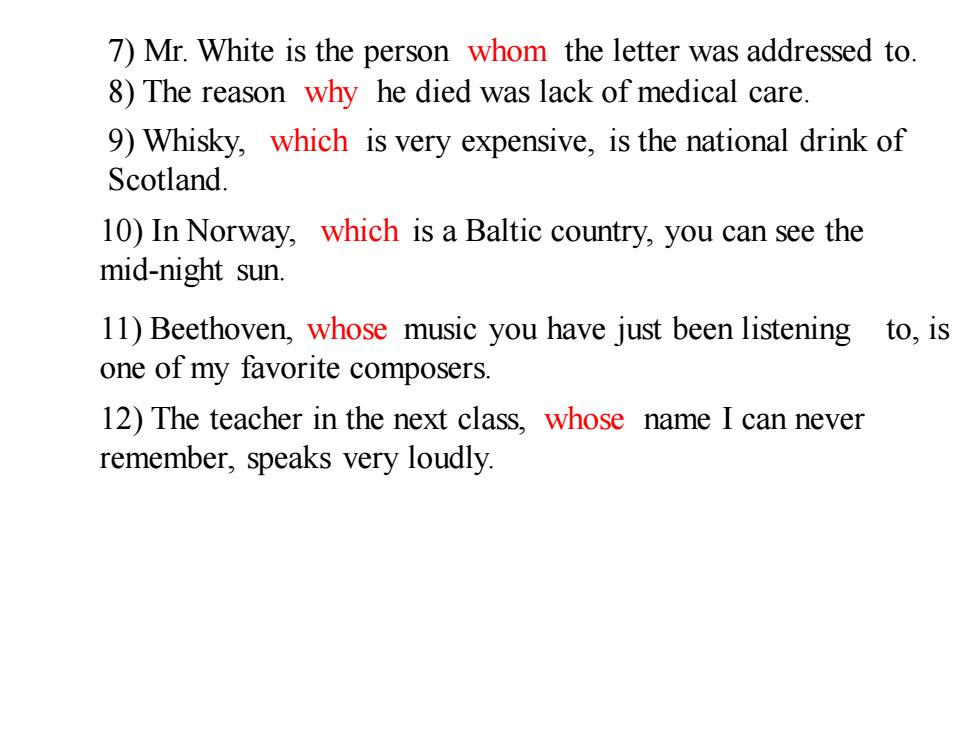
7)Mr.White is the person whom the letter was addressed to 8)The reason why he died was lack of medical care. 9)Whisky,which is very expensive,is the national drink of Scotland. 10)In Norway,which is a Baltic country,you can see the mid-night sun. 11)Beethoven,whose music you have just been listening to,is one of my favorite composers. 12)The teacher in the next class,whose name I can never remember,speaks very loudly
7) Mr. White is the person the letter was addressed to. whom 8) The reason he died was lack of medical care. why 9) Whisky, is very expensive, is the national drink of Scotland. which 10) In Norway, is a Baltic country, you can see the mid-night sun. which 11) Beethoven, music you have just been listening to, is one of my favorite composers. whose 12) The teacher in the next class, name I can never remember, speaks very loudly. whose
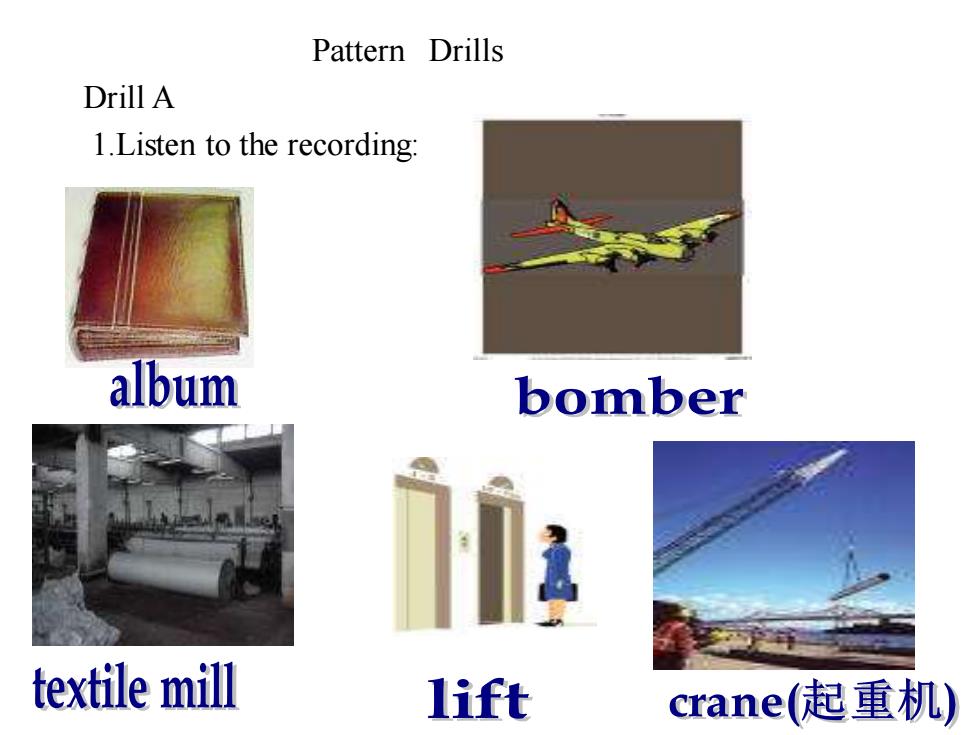
Pattern Drills Drill A 1.Listen to the recording: album bomber textile mill lift crane(起重机)
Pattern Drills Drill A 1.Listen to the recording:

2.Listen again --What is an album? ---It's a book that is used for collecting photographs, stamps,drawings,newspaper clippings,etc. 1)---What is a textile mill? ---It's a factory that makes cloth. 2)---What is a bomber? ---It's a war plane that drops bombs. 3)---What is a lift? ---It's a cage that takes you up and down in a tall building. 4)---What is a crane --It's a machine that lifts things
2. Listen again --- What is an album? --- It’s a book that is used for collecting photographs, stamps, drawings, newspaper clippings, etc. 1) --- What is a textile mill? --- It’s a factory that makes cloth. 2) --- What is a bomber? --- It’s a war plane that drops bombs. 3) --- What is a lift? --- It’s a cage that takes you up and down in a tall building. 4) --- What is a crane ? --- It’s a machine that lifts things
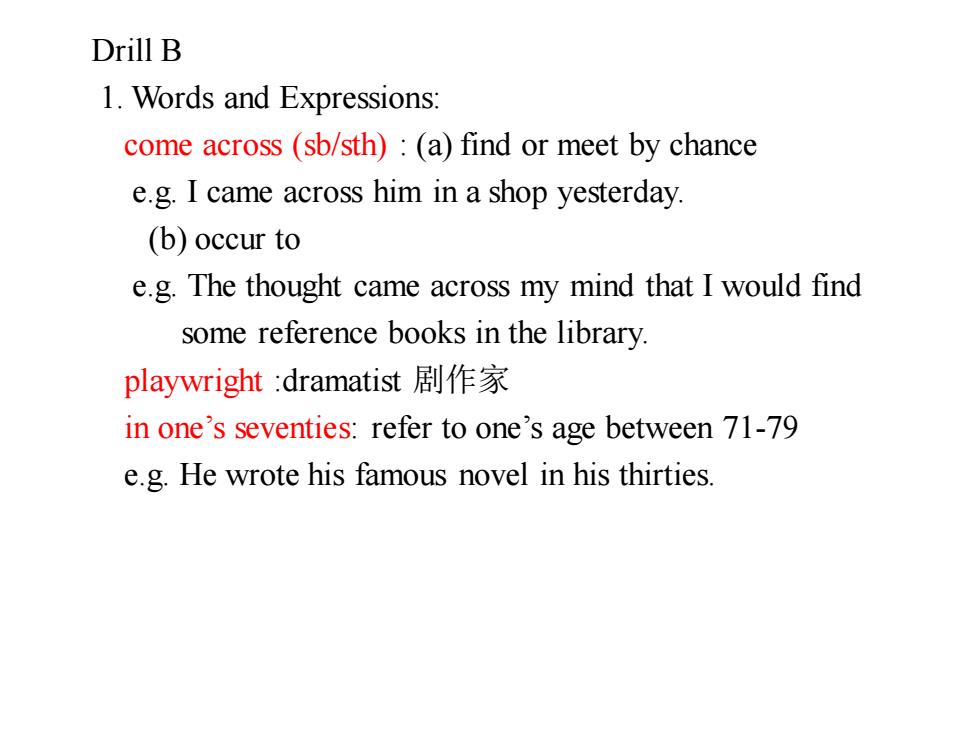
Drill B 1.Words and Expressions: come across(sb/sth):(a)find or meet by chance e.g.I came across him in a shop yesterday. (b)occur to e.g.The thought came across my mind that I would find some reference books in the library. playwright:dramatist剧作家 in one's seventies:refer to one's age between 71-79 e.g.He wrote his famous novel in his thirties
Drill B 1. Words and Expressions: come across (sb/sth) : (a) find or meet by chance e.g. I came across him in a shop yesterday. (b) occur to e.g. The thought came across my mind that I would find some reference books in the library. playwright :dramatist 剧作家 in one’s seventies: refer to one’s age between 71-79 e.g. He wrote his famous novel in his thirties